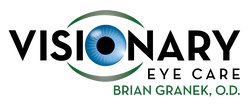Exams
FAQs
Why do so many people skip their annual eye exam?
We believe it's because they don't know what to expect. For this reason, we feel it's important to outline the process so you can feel comfortable knowing there's nothing to worry about.
We strongly encourage everyone to get a comprehensive eye exam once a year. Even if you do not have vision problems, a vision “check-up” can be critical in spotting and treating issues before they affect your vision. This is especially important for children who may not even realize that the problems they may be having in school are actually vision related. Our comprehensive eye exam is designed to provide a complete evaluation of your vision health.
Why is my personal background important?
Dr. Granek will review any current vision problems, your general health, as well as discuss your hobbies and lifestyle requirements to better tailor your examination and eyewear to meet your visual needs.
What can I expect from the overall exam?
In addition to determining your prescription, or how well you see up close and far away, your eye examination will also check to make sure your eyes are healthy. Dr. Granek may test your color vision, depth perception, as well as check for any early indicators of possible eye disorders, such as cataracts, retinal problems and glaucoma. Ultimately, the elements of your exam will be determined by Dr. Granek.
Why does the doctor ask me, "Which is better, one or two?"
Dr. Granek will ask these questions during the portion of the examination when your prescription is determined. He is a bit of a perfectionist, so he will likely ask you to compare a series of similar lenses to determine which is clearer for you. As the differences become less noticeable, he will be closer to finalizing your prescription. For this reason, if you're having a hard time choosing between the options, it's a good thing!
What about the test with the puff of air?
Don't worry!!! Dr. Granek does not use the puff of air and prefers a more precise measurement called Goldmann tonometry. This is an important test, as high pressure may be an indicator of glaucoma.
Why is it often necessary to know my blood pressure?
High blood pressure can affect the blood vessels in your eyes and can lead to future vision problems.
Why am I asked to follow a light with my eyes?
This test is used to determine how your pupils and eye muscles react, and is important in assessing neurological function.
Is it necessary to dilate my pupils during the exam?
Pupil dilation is not always necessary. Dr. Granek will make this decision during your exam. If required, this painless process allows Dr. Granek to get a wider view of the retina. Dilation can also help detect diseases such as diabetes, high blood pressure and macular degeneration.
Why do so many people skip their annual eye exam?
We believe it's because they don't know what to expect. For this reason, we feel it's important to outline the process so you can feel comfortable knowing there's nothing to worry about.
We strongly encourage everyone to get a comprehensive eye exam once a year. Even if you do not have vision problems, a vision “check-up” can be critical in spotting and treating issues before they affect your vision. This is especially important for children who may not even realize that the problems they may be having in school are actually vision related. Our comprehensive eye exam is designed to provide a complete evaluation of your vision health.
Why is my personal background important?
Dr. Granek will review any current vision problems, your general health, as well as discuss your hobbies and lifestyle requirements to better tailor your examination and eyewear to meet your visual needs.
What can I expect from the overall exam?
In addition to determining your prescription, or how well you see up close and far away, your eye examination will also check to make sure your eyes are healthy. Dr. Granek may test your color vision, depth perception, as well as check for any early indicators of possible eye disorders, such as cataracts, retinal problems and glaucoma. Ultimately, the elements of your exam will be determined by Dr. Granek.
Why does the doctor ask me, "Which is better, one or two?"
Dr. Granek will ask these questions during the portion of the examination when your prescription is determined. He is a bit of a perfectionist, so he will likely ask you to compare a series of similar lenses to determine which is clearer for you. As the differences become less noticeable, he will be closer to finalizing your prescription. For this reason, if you're having a hard time choosing between the options, it's a good thing!
What about the test with the puff of air?
Don't worry!!! Dr. Granek does not use the puff of air and prefers a more precise measurement called Goldmann tonometry. This is an important test, as high pressure may be an indicator of glaucoma.
Why is it often necessary to know my blood pressure?
High blood pressure can affect the blood vessels in your eyes and can lead to future vision problems.
Why am I asked to follow a light with my eyes?
This test is used to determine how your pupils and eye muscles react, and is important in assessing neurological function.
Is it necessary to dilate my pupils during the exam?
Pupil dilation is not always necessary. Dr. Granek will make this decision during your exam. If required, this painless process allows Dr. Granek to get a wider view of the retina. Dilation can also help detect diseases such as diabetes, high blood pressure and macular degeneration.

